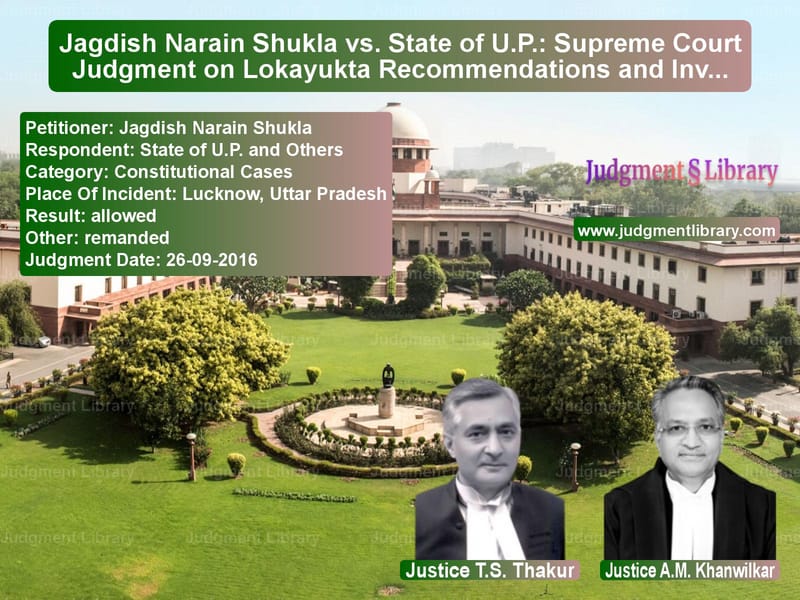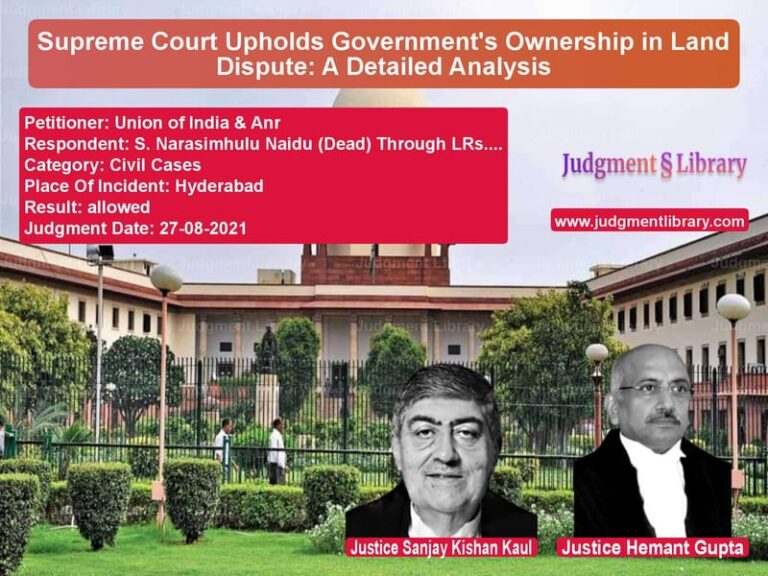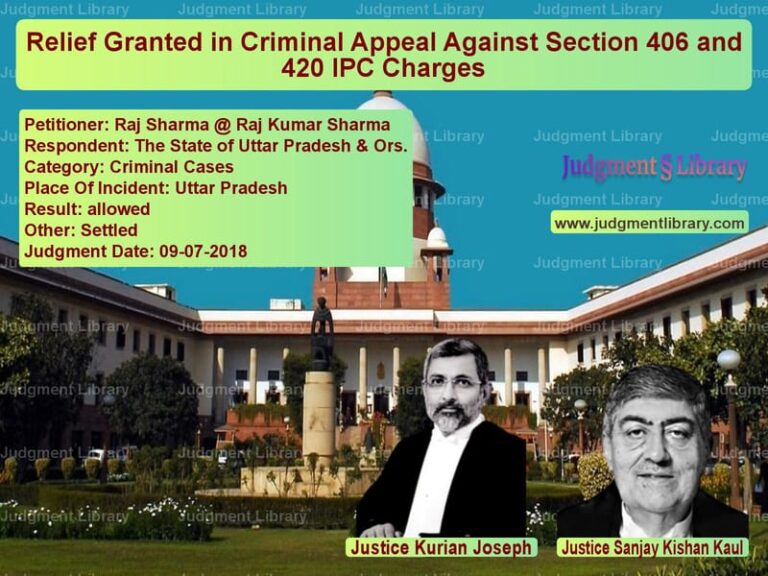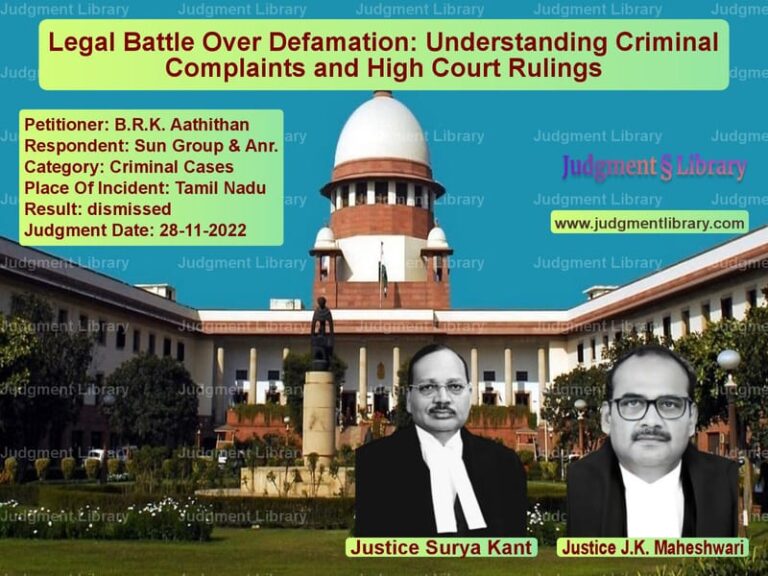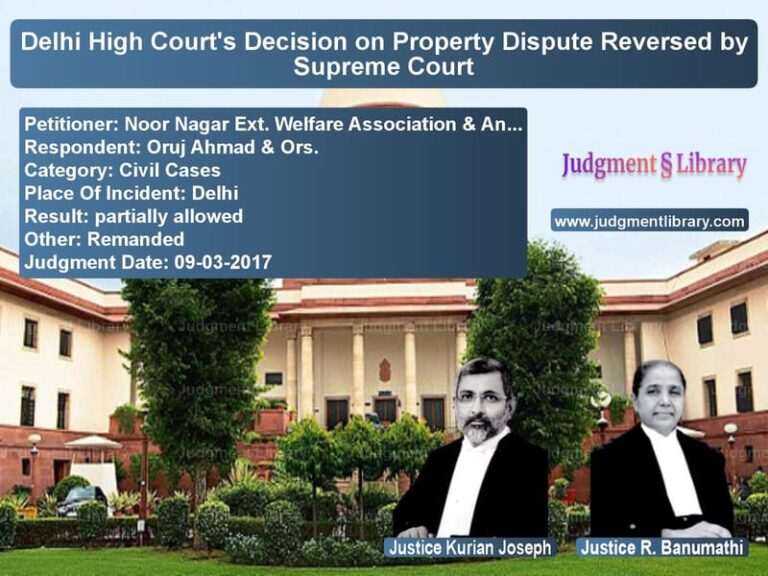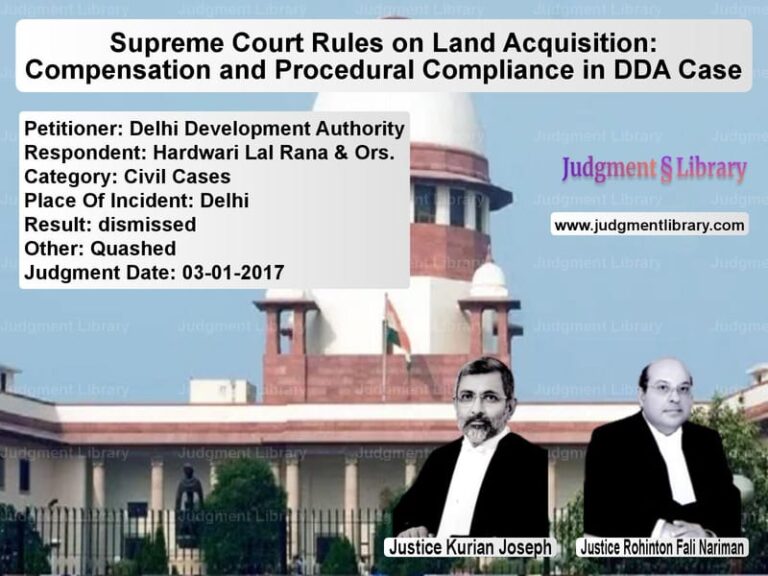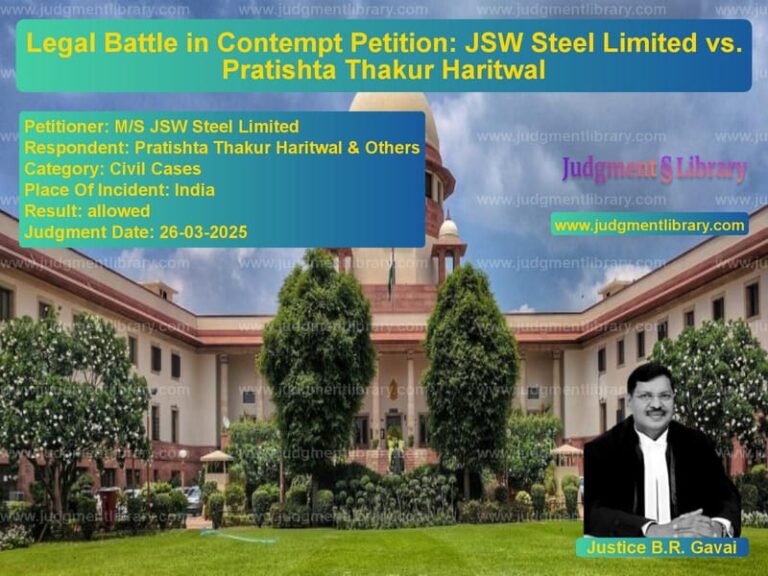Jagdish Narain Shukla vs. State of U.P.: Supreme Court Judgment on Lokayukta Recommendations and Investigation Delays
The Supreme Court of India delivered a landmark judgment in the case of Jagdish Narain Shukla vs. State of U.P., addressing the issue of non-compliance with the recommendations made by the Uttar Pradesh Lokayukta. The appellant, Jagdish Narain Shukla, filed a Public Interest Litigation (PIL) under Article 226 of the Constitution, seeking the implementation of the Lokayukta’s report and recommendations regarding the investigation into allegations of corruption and irregularities by public servants, specifically Smt. Husna Siddiqui and Sri Naseemuddin Siddiqui.
Background of the Case
In 2012, Jagdish Narain Shukla filed a complaint with the Uttar Pradesh Lokayukta, alleging that Smt. Husna Siddiqui, a Member of the Legislative Council, and Sri Naseemuddin Siddiqui, a former Cabinet Minister of Uttar Pradesh, had acquired land and property at significantly undervalued rates. The Lokayukta conducted an investigation and submitted a report in February 2012, detailing the alleged misconduct and recommending further investigation by a specialized agency, such as the Central Bureau of Investigation (CBI) or the Enforcement Directorate (ED). The report highlighted the discrepancies in the purchase of land and properties and called for a deeper probe into the sources of income of the accused public servants.
The State Government, however, did not take any immediate action on the Lokayukta’s recommendations, leading the appellant to file a writ petition before the High Court of Allahabad. The petition sought the implementation of the recommendations and a proper investigation into the allegations. The High Court dismissed the petition, stating that the Lokayukta’s report was not conclusive and that further investigation was required. The appellant then appealed to the Supreme Court, challenging the High Court’s decision.
Key Legal Issues
- Whether the recommendations made by the Lokayukta were binding and required immediate implementation.
- Whether the non-action by the State Government warranted judicial intervention.
- Whether the delay in investigating the allegations against the accused was a violation of the principle of accountability in public office.
Arguments Presented in Court
Arguments by the Appellant (Jagdish Narain Shukla):
- The appellant argued that the Lokayukta’s report had conclusively established the wrongdoing by the accused and that the failure of the State Government to implement the recommendations was a violation of the law.
- Shukla contended that the Lokayukta’s report should be treated as binding, as it was based on a thorough investigation of facts and evidence, and that further delay in initiating an investigation would only undermine the credibility of the public office.
- The appellant urged the Court to direct the State Government to refer the matter to a specialized investigating agency like the CBI or ED, as recommended by the Lokayukta, to ensure an independent and transparent investigation.
Arguments by the Respondent (State of U.P. and Others):
- The State Government argued that the Lokayukta’s report was not conclusive and that the recommendations made were only based on a prima facie finding, not an exhaustive legal inquiry.
- The respondents stated that there was a sufficient provision under the U.P. Lokayukta and Up-Lokayuktas Act, 1975, to take appropriate steps and that it was not for the courts to direct the implementation of the report.
- The respondents also contended that the investigation was still in progress and that no conclusive findings had been reached yet regarding the allegations against the public servants.
Supreme Court’s Observations
The Supreme Court carefully considered the arguments presented by both parties and evaluated the legal implications of the Lokayukta’s report. The Court acknowledged the importance of the Lokayukta as an institution established for the purpose of addressing corruption and ensuring accountability in public office.
The Court noted that:
“The report submitted by the Lokayukta, though not conclusive in its findings, raises serious questions about the conduct of the public servants involved. However, this Court is not in a position to take over the role of an investigative agency, and thus the issue should be referred to a specialized agency for a thorough investigation.”
The Court also addressed the delay in action by the State Government and emphasized that:
“The delay in initiating the investigation and implementing the recommendations of the Lokayukta undermines the very purpose of the Lokayukta Act. The Government must act promptly to ensure that such matters are investigated in a timely and transparent manner.”
Furthermore, the Court observed the legal principle that public servants must be held accountable for their actions, especially when allegations of corruption and financial irregularities are raised.
Final Judgment
The Supreme Court disposed of the appeal by directing the State Government to take immediate action based on the Lokayukta’s recommendations. The Court ordered:
- The matter should be referred to a specialized investigating agency, such as the CBI or ED, for a comprehensive investigation into the allegations of financial misconduct.
- The investigating agency should complete the investigation and submit a report to the State Government within six months from the date of the order.
- The State Government should cooperate fully with the investigation and ensure that the due process of law is followed without any further delays.
The Court further stated that no further adjournments would be allowed, and the investigation must be completed expeditiously to ensure that justice is served.
Implications of the Judgment
This judgment has important implications for both the functioning of the Lokayukta and the accountability of public servants:
- Affirmation of Lokayukta’s Role: The judgment reaffirms the importance of the Lokayukta’s findings and its role in promoting accountability within public offices, even though its recommendations are not legally binding in every case.
- Judicial Oversight in Corruption Cases: The ruling highlights the importance of judicial oversight in ensuring that cases involving corruption are not delayed indefinitely, especially when public interest is at stake.
- Accountability of Public Servants: The case underscores that public servants must be investigated thoroughly when there are allegations of corruption, and accountability must be maintained through a transparent process.
- Importance of Timely Investigations: The judgment also emphasizes the need for timely investigations and the prompt implementation of recommendations from investigative bodies.
Conclusion
The Supreme Court’s ruling in the case of Jagdish Narain Shukla vs. State of U.P. serves as a reminder of the importance of timely and transparent investigations in cases of corruption. By directing the matter to a specialized investigative agency, the Court has ensured that the allegations against public servants will be thoroughly examined, and justice will be served. This case reinforces the role of the judiciary in overseeing the implementation of accountability measures and ensuring that corruption cases are dealt with swiftly and effectively.
Don’t miss out on the full details! Download the complete judgment in PDF format below and gain valuable insights instantly!
Download Judgment: Jagdish Narain Shukl vs State of U.P. and Ot Supreme Court of India Judgment Dated 26-09-2016-1741883834907.pdf
Direct Downlaod Judgment: Direct downlaod this Judgment
See all petitions in Fundamental Rights
See all petitions in Separation of Powers
See all petitions in Judgment by T.S. Thakur
See all petitions in Judgment by A M Khanwilkar
See all petitions in allowed
See all petitions in Remanded
See all petitions in supreme court of India judgments September 2016
See all petitions in 2016 judgments
See all posts in Constitutional Cases Category
See all allowed petitions in Constitutional Cases Category
See all Dismissed petitions in Constitutional Cases Category
See all partially allowed petitions in Constitutional Cases Category

